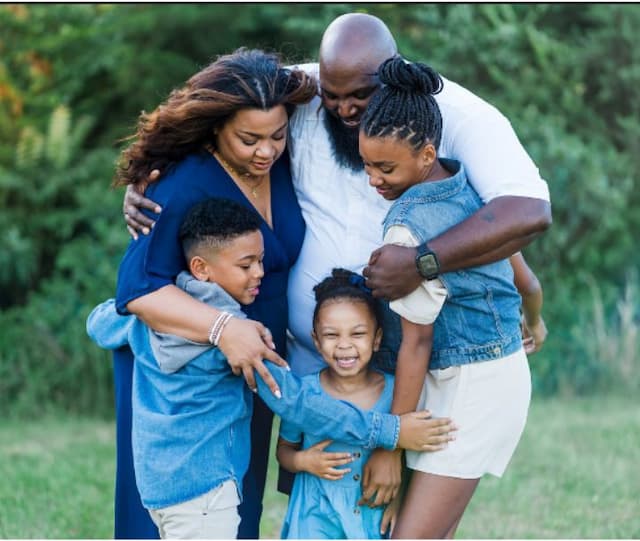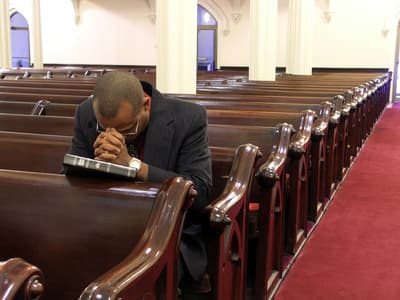God of the Underdog - The Grace to Grow

I want to tell you guys the story of Robert Smalls. And underdog that highlights that our God is God of all, even God of the underdog.
Robert Smalls was born to a house slave in Beaufort, North Carolina in 1839. At the beginning of the US civil war, he was assigned to work on a confederate supply ship. Robert paid careful attention to how the ship was operated and when he had it figured out, he and the rest of the slave crew took over the ship in the middle of the night and escaped.
Their success persuaded Abraham Lincoln to allow black men to fight for the union army. After the war, he returned to the home where he had been enslaved and bought the property. He kindly took in some of the newly destitute family that had previously “owned” him. He then, against all odds, influentially climbed the ranks in politics, and is remembered as an important person in history to this day.
God of the Underdog – For the Glory of God
This is not a story to stir admiration for Robert Smalls, though he is, certainly, an inspiring individual. The reason I share this story is to show how God used a young man who had nothing, not even his own freedom, to bring change to a nation, hope to a race, and grace to those who mistreated him. You see, the day that he was born the illegitimate son of an abused housemaid, no one would have imagined that he would do anything more than live in chains. But God saw him differently than people did, and God had a different plan. Likewise, in the scripture we’re studying today, we see that while man was busy looking at outside factors, God was looking to the heart. God had a different plan in this story, too… and his plans are so much better than the ones humans devise.
1st Samuel 16:4-7 says, “Samuel did what the Lord commanded and came to Bethlehem. The elders of the city came to meet him trembling and said, “do you come peaceably?” And he said, “Peaceably; I have come to sacrifice to the Lord. Consecrate yourselves and come with me to the sacrifice.” And he consecrated Jesse and his sons and invited them to the sacrifice. When they came, he looked on Eliab and thought, “Surely the Lord’s anointed is before him.” But the Lord said to Samuel, “Do not look on his appearance or on the height of his stature, because I have rejected him. For the Lord sees not as man sees: man looks on the outward appearance, but the Lord looks on the heart.”
Man looks on the outward appearance, but the Lord looks on the heart.
Let’s begin looking at this by going back a little bit. The people of Israel had asked for a king. They had told Samuel that they wanted a king like all the other nations had. Samuel was bothered by this, so he went to the Lord in prayer. God told him to go ahead and do what the people asked. He told Samuel the truth- the people’s desire for a king was not a rejection of Samuel, but a rejection of God. Despite what God had done for the people since Creation, they wanted more– they wanted a human solution. They wanted a human to be their king and saviour.
Samuel warned the people what it would be like to have a king. They had romanticized the idea. Maybe we can relate to that. Even today we seem to think that a political party or a certain politician will solve our problems. And while it may make some difference, it never measures up to the ideal in our minds. Despite Samuel’s warnings, the people INSISTED that they needed a king so that they could be like other nations. They wanted to LOOK like other nations. To BE like other nations. They wanted a king to judge them and to “fight their battles,” as it says in 1 Samuel 8:20.
God of the Underdog – Giving the people what they want
God appointed Saul as king. Saul was everything Israel could want in a king. Tall, handsome, strong… and we all know that’s what makes a real leader, right? (haha). As time went on, Saul began to change. He chose not to follow God’s commands, and instead went his own way. He became addicted to power and wanted to hold on to it at any cost.
The truth can’t be denied, though: the people wanted a particular kind of king, and God gave them that kind of king. They wanted to LOOK like the other nations. So, he gave them a king that LOOKED the part. But at the beginning of chapter 16, after having told Samuel that he was going to reject Saul as king over Israel, God said in verse 1 that, “I have provided for myself a king.” Saul had been the king the people desire; the new king would be the king that God desired.
This is our first look in this story that what God desires is often not what we desire; that what God sees as important is not always what we see as important; that the things humanity values are so often not what God values.
 Tall and Handsome is all we Need… Right?
Tall and Handsome is all we Need… Right?
Now, when Samuel met Jesse’s sons, he looked at Eliab, the oldest, and thought, “surely this is the king.” Eliab was tall, handsome, strong… remember, we talked about this… those are the only important qualities you need to look for in a leader, right??? Yea, not so much.
God, in His great patience towards us slow-to-learn-humans, explained to Samuel that He does not see as man sees. Can we just take a minute to give a brief but hearty hallelujah for that fact? GOD DOES NOT SEE AS WE DO. He says that man looks at the outward appearance; from that is where humanity casts our first judgement. But God… God looks at the heart. The Israelites just had a king that was celebrated for his strength, height and looks… and right away… Samuel thinks that’s the goal again. But God’s goals are higher. His ways are higher. And he doesn’t look at the outward appearance, he looks at the HEART.
God Doesn’t Look to the Outside – He Looks to the Heart
This distinction matters. I think we can all agree, no matter what views or perspectives we hold, right now we live in a topsy-turvy world. We’re chasing our tails looking for human solutions to spiritual problems. We look to those who are powerful- Maybe they’re good-looking, or charismatic, or wealthy… and we think that surely, they’ll have an answer. Surely, they can lead us out of this. Surely, they can be our saviour… But at every turn, that philosophy falls apart. Humans can’t be our saviours. Thank God that He sees things differently. Let’s talk about 3 ways that we can learn from this and apply it to our own lives:
- Those the world deems “small” (the underdog) can have the greatest hearts for God and be used by God, even though they’re not sinless.
- Our weakness brings God glory
- Recognizing our true Saviour
Underdogs of the Bible – Those the World Would Call “Small.”
When David was chosen by God, he was small. He was young. He was the underdog. But God called him the king after His own heart. The one that He chose as Jesus’ ancestor. In the childhood stories of David, like David and Goliath, David is often presented as the hero. But the story of David’s life ultimately points to Jesus being the hero.
David was not a perfect man. He may have an amazing underdog story, but he was still a sinner. He went so far as murder. That was not an “unexpected” sin at all, but a pre-meditated one. In Psalm 51, David acknowledges his sin and cries to God for forgiveness. In verses 1 and 2 he says, “Have mercy on me, O God, according to your steadfast love, according to your abundant mercy blot out my transgressions. Wash me thoroughly from my iniquity and cleanse me from my sin.”
There are many examples of “underdogs” in the Bible. Another is Rahab. Again, her story is often cast as “harlot to heroine,” but her story also points to God being the hero. She was a prostitute, but bravely chose to help the Israelites defeat Jericho. It’s easy to view her as the heroine- who doesn’t want to cheer for the woman who goes from prostitution to conqueror? But the only reason she chose to help the Israelites is because she recognized her weakness and more than that, she recognized the power of God. She saw that her worth didn’t come from her “heroism,” but from the fact that only God could wipe her slate clean.
Much like the story of Robert Smalls that I shared at the beginning, the Bible is filled with true stories of underdogs being used for great purposes. The same is true today. The underdogs amongst us… really, any one of us, can be used by God. But not for the glory of the underdog… it’s for the glory of God.
The Underdog – Used By God for the Glory of God
This leads us to the second application point. This one is short but important. The underdog is used for the glory of God. In 2nd Corinthians 12, Paul is talking of the “thorn” in his flesh. While Paul may not be a “typical” underdog, he was an underdog in the sense that he called himself the “chief of sinners.” Before his conversion, he had participated in and approved of the torture and killings of Christians. So… for a man like him to be used for the Kingdom of God… well, in that case, we could consider him an underdog.
He says that he had pleaded with God to remove the thorn from him, but it stayed with him. Paul called this ailment “a messenger of Satan” that was sent to harass him and to keep him from becoming conceited. He then goes on to say, “But He said to me (referencing God), “My grace is sufficient for you, for my power is made perfect in weakness. Therefore, I will boast all the more gladly of my weaknesses, so that the power of Christ may rest upon me. For the sake of Christ, then, I am content with weaknesses, insults, hardships, persecutions, and calamities. For when I am weak, then I am strong.”
The Beauty of Weakness
God knows that we need weakness in our lives to, first, recognize His strength and, second, to showcase His glory. And Paul benefited from his ailment, too… he benefited from his “thorn.” Much like we benefit from our thorns. I don’t know about you all, but I have learned more from the hardships in my life than the good times. Because of that, I wouldn’t change those hard things a bit. This is confirmed in Romans 5:3-5 where it says:
“Not only that, but we rejoice in our sufferings, knowing that suffering produces endurance, and endurance produces character, and character produces hope, and hope does not put us to shame, because God’s love has been poured into our hearts through the Holy Spirit who has been given to us.” The sufferings of the “underdog” … the sufferings of all of us… are not wasted. They produce endurance, character, and hope. And that hope is such a beautiful gift.
So yes, God uses the underdog. He equips the underdog. He shapes the character of the underdog. But not for the glory of the underdog. It’s for the glory of God.
Recognizing Our True Saviour
It’s so important that glory is given where glory is due. And it’s due to God. It’s due to Jesus. It’s due to our ACTUAL Saviour. This is the third and final application point. We need to know who our Saviour really is. We’ve learned that our Saviour isn’t just the tallest, strongest, most handsome man we can find.
We’ve learned that some of the famous underdogs of the Bible did some great things, but they were still sinful. And a sinful person can’t be the Saviour we need. The Saviour we need must be perfect. Just like a spotless lamb was required for sacrifice in the Old Testament, THE Spotless Lamb was required as the sacrifice to cover our sins. And He came and did just that.
The Propitiation
Our sins separate us from God. All of us have sinned. As it says in Romans 3, “We all sin and fall short of the glory of God. But God, being rich in mercy, justified us by His grace as a gift, through the redemption that is in Christ Jesus, whom God put forward as a propitiation by his blood, to be received by faith.” Why did He do this for us? WHY would He do this? He was already in perfect relationship- Father, Son and Holy Spirit. He didn’t need us. So why did He save us?
Well, if we keep reading in Romans 3, we find out. It goes on to say, “This was to show God’s righteousness.” Do you hear that? It was to SHOW God’s righteousness. Not our counterfeit righteousness… it was to show God’s righteousness. To show HIS justice. To show HIS glory. It is not for us to boast. But if we do boast, we must remember what it says in 1st Corinthians 1:28-31:
“God chose what is low and despised in the world, even things that are not, to bring to nothing things that are, so that no human being might boast in the presence of God. And because of Him you are in Christ Jesus, who became to us wisdom from God, righteousness and sanctification and redemption, so that, as it is written, “Let the one who boasts, boast in the Lord.”
God of the Underdog, for the Glory of God.
We spent a fair amount of time talking about underdogs today. Or, to borrow language from that 1st Corinthians passage, “those who are low and despised in the world.” What a beautiful thing that God sees differently than we do; what a beautiful thing that He looks at the heart, rather than the outside. And what a beautiful thing that He does it not for our glory- He knows that would only throw us into vanity and sin. He does it for HIS glory. He makes it clear that without Him… we would be lost to darkness.
Because of Him, we walk in the light of Christ Jesus, our true and eternal Saviour.




